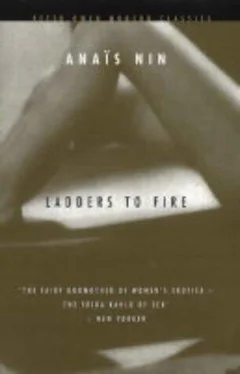Anaïs Nin - Ladders to Fire
Здесь есть возможность читать онлайн «Anaïs Nin - Ladders to Fire» весь текст электронной книги совершенно бесплатно (целиком полную версию без сокращений). В некоторых случаях можно слушать аудио, скачать через торрент в формате fb2 и присутствует краткое содержание. Год выпуска: 2004, ISBN: 2004, Издательство: Peter Owen Limited, Жанр: Классическая проза, Эротические любовные романы, на английском языке. Описание произведения, (предисловие) а так же отзывы посетителей доступны на портале библиотеки ЛибКат.
- Название:Ladders to Fire
- Автор:
- Издательство:Peter Owen Limited
- Жанр:
- Год:2004
- ISBN:9780720611625
- Рейтинг книги:5 / 5. Голосов: 1
-
Избранное:Добавить в избранное
- Отзывы:
-
Ваша оценка:
- 100
- 1
- 2
- 3
- 4
- 5
Ladders to Fire: краткое содержание, описание и аннотация
Предлагаем к чтению аннотацию, описание, краткое содержание или предисловие (зависит от того, что написал сам автор книги «Ladders to Fire»). Если вы не нашли необходимую информацию о книге — напишите в комментариях, мы постараемся отыскать её.
Cities of the Interior
Children of the Albatross
The Four-Chambered Heart
A Spy in the House of Love
Solar Barque
Ladders to Fire — читать онлайн бесплатно полную книгу (весь текст) целиком
Ниже представлен текст книги, разбитый по страницам. Система сохранения места последней прочитанной страницы, позволяет с удобством читать онлайн бесплатно книгу «Ladders to Fire», без необходимости каждый раз заново искать на чём Вы остановились. Поставьте закладку, и сможете в любой момент перейти на страницу, на которой закончили чтение.
Интервал:
Закладка:
Lillian could not understand. They were two different loves, and could not interfere with each other.
She saw, however, that Gerard was paralyzed, that the very thought of the two loves confronting each other meant dea
He retreated. The next day he was ill, ill with terror. He sought to explain. “I have to take care of my mother.”
“Well,” said Lillian, “I will help you.”
This did not reassure him. At night he had nightmares. There was a resemblance between the two natures, and to possess Lillian was like possessing the mother, which was taboo. Besides, in the nightmare, there was a battle between the two possessions in which he won nothing but a change of masters. Because both his mother and Lillian (in the nightmare they were confused and indistinguishable), instead of living out their own thoughts, occupying their own hands, playing their own instruments, put all their strength, wishes, desires, their wills on him. He felt that in the nightmare they carved him out like a statue, they talked for him, they acted for him, they fought for him, they never let him alone. He was merely the possessed. He was not free.
Lillian, like his mother, was too strong for him. The battle between the two women would be too strong for him. He could not separate them, free himself and make his choice. He was at a disadvantage. So he feared: he feared his mother and the outcries, the scenes, dramas, and he feared Lillian for the same reason since they were of the same elements: fire and water and aggression. So he feared the new invasion which endangered the pale little flame of his life. In the center of his being there was no strength to answer the double challenge. The only alternative was retreat.
When he was six years old he had asked his mother for the secret of how children were born. His mother answered: “I made you.”
“You made me?” Gerard repeated in utter wonder. Then he had stood before a mirror and marveled: “You made this hair? You made this skin?”
“Yes,” said his mother. “I made them.”
“How difficult it must have been, and my nose! And my teeth! And you made me walk, too.” He was lost in admiration of his mother. He believed her. But after a moment of gazing at the mirror he said: “There is one thing I can’t believe. I can’t believe that you made my eyes!”
His eyes. Even today when his mother was still making him, directing him, when she cut his hair, fashioned him, carved him, washed his clothes, what was left free in this encirclement of his being were his eyes. He could not act, but he could see.
But his retreat was inarticulate, negative, baffling to Lillian. When she was hurt, baffled, lost, she in turn retreated, then he renewed his pursuit of her. For he loved her strength and would have liked it for himself. When this strength did not threaten him, when the danger was removed, then he gave way to his attraction for this strength. Then he pursued it. He invited and lured it back, he would not surrender it (to Serge or anyone else). And Lillian who suffered from his retreat suffered even more from his mysterious returns, and his pursuits which ceased as soon as she responded to them.
He was playing with his fascination and his fear.
When she turned her back on him, he renewed his charms, enchanted her and won her back. Feminine wiles used against woman’s strength like women’s ambivalent evasions and returns. Wiles of which Lillian, with her straightforward manly soul, knew nothing.
The obstacle only aroused Lillian’s strength (as it aroused the knights of old) but the obstacle discouraged Gerard and killed his desire. The obstacle became his alibi for weakness. The obstacle for Gerard was insurmountable. As soon as Lillian overcame one, Gerard erected another. By all these diversions and perversions of the truth he preserved from her and from himself the secret of his weakness. The secret was kept. The web of delusion grew around their love. To preserve this fatal secret: you, Lillian, are too strong; you, Gerard, are not strong enough (which would destroy them), Gerard (like a woman) wove false pretexts. The false pretexts did not deceive Lillian. She knew there was a deeper truth but she did not know what it was.
Weary of fighting the false pretexts she turned upon herself, and her own weakness, her self-doubts, suddenly betrayed her. Gerard had awakened the dormant demon doubt. To defend his weakness he had unknowingly struck at her. So Lillian began to think: “I did not arouse his love. I was not beautiful enough.” And she began to make a long list of self-accusations. Then the harm was done. She had been the aggressor so she was the more seriously wounded. Self-doubt asserted itself. The seed of doubt was implanted in Lillian to work its havoc with time. The real Gerard receded, faded, vanished, and was reinstated as a dream image. Other Gerards will appear, until…
After the disappearance of Gerard, Lillian resumed her defensive attitude towards man, and became again the warrior. It became absolutely essential to her to triumph in the smallest issue of an argument. Because she felt so insecure about her own value it became of vital importance to convince and win over everyone to her assertions. So she could not bear to yield, to be convinced, defeated, persuaded, swerved in the little things.
She was now afraid to yield to passion, and because she could not yield to the larger impulses it became essential also to not yield to the small ones, even if her adversary were in the right. She was living on a plane of war. The bigger resistance to the flow of life became one with the smaller resistance to the will of others, and the smallest issue became equal to the ultimate one. The pleasure of yielding on a level of passion being unknown to her, the pleasure of yielding on other levels became equally impossible. She denied herself all the sources of feminine pleasure: of being invaded, of being conquered. In war, conquest was imperative. No approach from the enemy could be interpreted as anything but a threat. She could not see that the real issue of the war was a defense of her being against the invasion of passion. Her enemy was the lover who might possess her. All her intensity was poured into the small battles; to win in the choice of a restaurant, of a movie, of visitors, in opinions, in analysis of people, to win in all the small rivalries through an evening.
At the same time as this urge to triumph continuously, she felt no appeasement or pleasure from her victories. What she won was not what she really wanted. Deep down, what her nature wanted was to be made to yield.
The more she won (and she won often for no man withstood this guerrilla warfare with any honors—he could not see the great importance that a picture hung to the left rather than to the right might have) the more unhappy and empty she felt.
No great catastrophe threatened her. She was not tragically struck down as others were by the death of a loved one at war. There was no visible enemy, no real tragedy, no hospital, no cemetery, no mortuary, no morgue, no criminal court, no crime, no horror. There was nothing.
She was traversing a street. The automobile did not strike her down. It was not she who was inside of the ambulance being delivered to St. Vincent’s Hospital. It was not she whose mother died. It was not she whose brother was killed in the war.
In all the registers of catastrophe her name did not appear. She was not attacked, raped, or mutilated. She was not kidnapped for white slavery.
But as she crossed the street and the wind lifted the dust, just before it touched her face, she felt as if all these horrors had happened to her, she felt the nameless anguish, the shrinking of the heart, the asphyxiation of pain, the horror of torture whose cries no one hears.
Every other sorrow, illness, or pain is understood, pitied, shared with all human beings. Not this one which was mysterious and solitary.
Читать дальшеИнтервал:
Закладка:
Похожие книги на «Ladders to Fire»
Представляем Вашему вниманию похожие книги на «Ladders to Fire» списком для выбора. Мы отобрали схожую по названию и смыслу литературу в надежде предоставить читателям больше вариантов отыскать новые, интересные, ещё непрочитанные произведения.
Обсуждение, отзывы о книге «Ladders to Fire» и просто собственные мнения читателей. Оставьте ваши комментарии, напишите, что Вы думаете о произведении, его смысле или главных героях. Укажите что конкретно понравилось, а что нет, и почему Вы так считаете.












